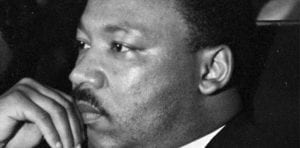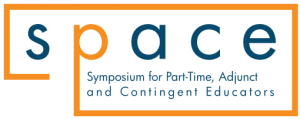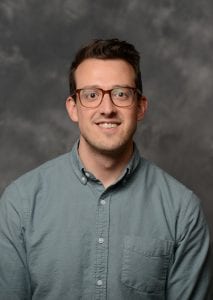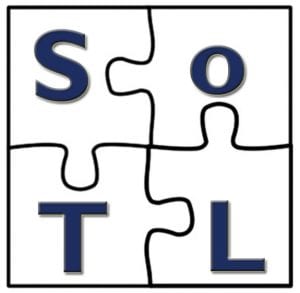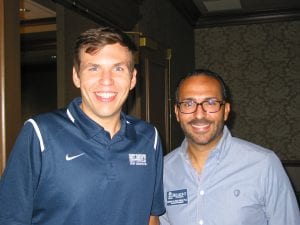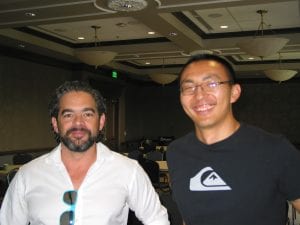 In October, the Teaching Center hosted a lunch discussion entitled, “The Needs of Veterans as Students”, to continue the conversation about how we, as teachers, can create welcoming spaces in our classrooms for veterans to thrive and contribute in their own unique ways while integrating into our communities of learning. A panel of current Belmont student veterans shared their experiences and perspectives in the classroom and encouraged continued communication among students, faculty, staff, and administrators. Assistant Professor of Social Work, Jenny Crowell, reflects on the lunch discussion and her experiences with veteran students below.
In October, the Teaching Center hosted a lunch discussion entitled, “The Needs of Veterans as Students”, to continue the conversation about how we, as teachers, can create welcoming spaces in our classrooms for veterans to thrive and contribute in their own unique ways while integrating into our communities of learning. A panel of current Belmont student veterans shared their experiences and perspectives in the classroom and encouraged continued communication among students, faculty, staff, and administrators. Assistant Professor of Social Work, Jenny Crowell, reflects on the lunch discussion and her experiences with veteran students below.
Students panelists (from left to right), Reginald Ordonez (Entrepreneurship), Shelby Powell (Social Work), Eric Hyde (Entrepreneurship), and Antonio Hale (Exercise Science)
The Needs of Veterans as Students
Jennifer Crowell, Ph.D.
Assistant Professor of Social Work
More than 500,000 veterans and their families have utilized Post-9/11 GI Bill benefits since the law’s enactment in 2008 (American Council on Education [ACE], 2012). These students are the beneficiaries of unprecedented support for higher education at a time in which there is an ever growing mandate for a highly trained and skilled labor force. Efforts aimed at reintegration and retention are vast. A survey of 690 educational institutions that serve veterans indicated that these students are offered an array of services. Eighty-nine percent of institutions surveyed report having increased their emphasis on these services since September 2001. Such services range from academic and financial counseling, to education on benefits and mentorship (ACE, 2012).
However, despite these important efforts aimed at supporting veterans as they transition to campus, recent data collected in the National Survey of Veterans indicate Iraq and Afghanistan (OIF/OEF) veterans are experiencing below average degree completion rates (54.3%), as compared to veterans from previous service eras (66.8% of the veterans who served from the Korean conflict through August of 2001) (Westat, 2010). The American Council on Education (2013) holds that best practices related to supporting veterans transitioning into higher education include both peer-to-peer counseling, as well as maintaining a trained and dedicated staff knowledgeable in Veteran Affairs benefits and the unique academic requirements of their specific institutions. While incredibly useful in outlining an institutional approach to supporting student veterans, there is little information presented in this toolkit regarding how individual classroom experiences impact student veteran success. Faculty are encouraged to simply open lines of communication with veteran students. While this would be essential, there seems much more that could be shared with faculty to enhance the support veteran students receive; support that that may help with their reintegration to civilian life and possibly improve retention and graduation rates. In what ways can individual faculty members approach their mentorship and teaching so as to better serve student veterans in their respective courses?
In my work both on campus and off, I have begun to listen for answers to this question. The increasing number of students with former military experience enrolling in my classes over the last six years have been my best teachers. They have shared with me the importance of recognizing their history, and yet respecting their privacy. They appreciate the acknowledgement that they are adults who are embarking on a second career; youthful as many may be, they bring a wealth of experience to our classroom. They value being able to choose when to share that experience and when to remain silent. Many hold a frustration with civilian life and desire to connect with one another, especially when on campus. They balance this frustration with an apprehension about being labeled and a desire to blend in. By no means are their suggestions and personal preferences generalizable, but they have been consistent and powerful. The student veterans I have had the privilege of working with have shattered deep rooted stereotypes and made way for my ever growing appreciation of their shared strengths.
It is my opinion that faculty have an opportunity to play an essential role in supporting student veterans. We are uniquely privileged in our ability to create a space in which veteran students feel empowered and valued. We can use our role in the classroom to foster an increased awareness of the needs of this cohort of students, while being careful not to single them out. We can connect those interested with campus supports and mentor them in finding ways to use their previous career in their studies and work; thereby honoring their experiences and training. These students are some of the most prepared and wholly engaged students I have yet had the privilege to teach. Offering them the space to showcase their strengths might serve to benefit every one of us.
References
American Council on Education (2013). Toolkit for veteran friendly institutions. Retrieved from http://www.acenet.edu/news-room/Pages/Toolkit-for-Veteran-Friendly-Institutions.aspx
American Council on Education (2012). From soldier to student II: Assessing campus programs for veterans and service members. Retrieved from
http://www.acenet.edu/newsroom/Documents/From-Soldier-to-Student-II-Assessing-Campus-Programs.pdf
Westat (2010). National survey of veterans, active duty service members, demobilized national guard and reserve members, family members, and surviving spouses. Final Report, Deliverable 27. Retrieved from http://http://www.va.gov/vetdata/docs/SurveysAndStudies/NVSSurveyFinalWeightedReport.pdf
 Jeremy Fyke, Ph.D.
Jeremy Fyke, Ph.D.


